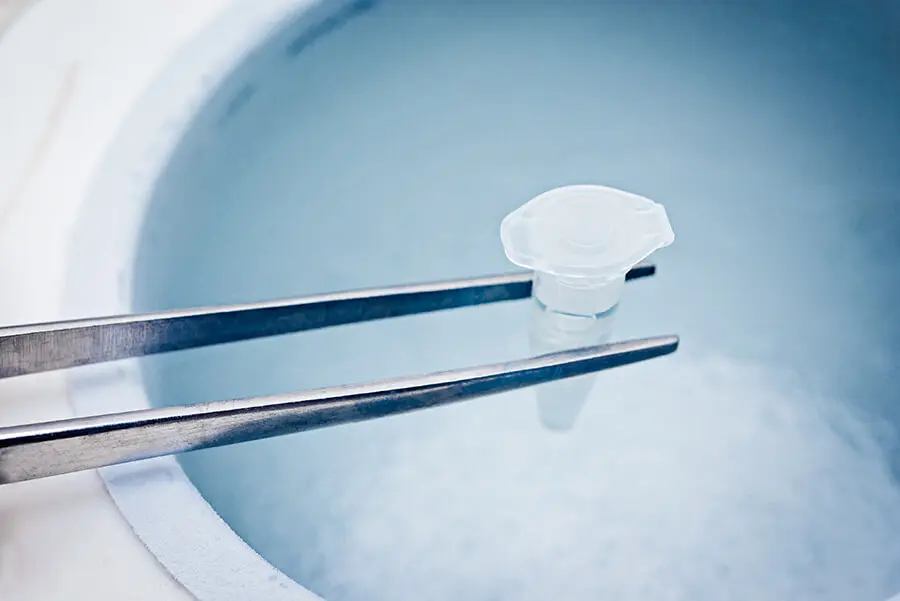Posted September 27, 2023 in Egg Freezing
4 minute read

Fertility planning looks different for everyone. Some parents start their paths as soon as possible, while others start their journey by planning for the future.
If your fertility plan involves waiting, but you still want to preserve your future ability to have children, egg freezing might be the answer.
Why Do Some Women Freeze Their Eggs?
There are many reasons why a woman might choose to freeze her eggs. Typically, a woman’s eggs lose some viability after age 35.
The most common age for women who freeze their eggs is 35 to 38, but this can vary.
Some women freeze their eggs due to health reasons, such as chronic illness or cancer, which can affect their fertility. This can be due to the illness itself or chemotherapy or radiation she must receive. Here, freezing your eggs allows you to preserve eggs for when you are healthy again and have completed treatment.
Another reason is age or lifestyle. When egg freezing first became popular, the most common patients were women in their late thirties without a partner. Rather than miss their fertile years waiting for a relationship, these women chose to preserve their eggs and effectively “pause their biological clock” to have children when ready.
This is still a common reason for egg freezing.
Additionally, more people are waiting until later in life to have children. Many women have goals they wish to accomplish, such as completing school or becoming more established in their careers. In this case, women preserve their eggs to allow themselves time to become comfortable with other aspects of their lives without the stress of their biological clock.
No matter the reason, preserving your eggs gives you options. And with options, you have more agency in planning your future fertility. Egg freezing allows women to start their families when they want, with better financial stability and healthier conditions.
What Is the Egg Freezing Process?
The general process of egg freezing involves preparing your body for optimum egg production, retrieval, and freezing of the eggs.
At Inovi Fertility & Genetics Institute in Houston, we go the extra mile to ensure the safety and success of egg-freezing procedures.
Our process of freezing your eggs is as follows:
- Step 1: You will be tested to determine the quantity of eggs. You will also undergo blood tests, hormone tests, an ovarian ultrasound, and other tests to check for disease and genetic disorders
- Step 2: You will be given medications to stimulate your ovaries and increase the number of eggs retrieved during the cycle.
- Step 3: You will undergo additional blood tests to assess ovarian stimulation.
- Step 4: You will have a pelvic ultrasound to monitor your follicles and egg maturation.
- Step 5: You will undergo egg retrieval, during which the eggs will be removed from your ovaries.
- Step 6: Your eggs are frozen and stored for future use.
What Happens After My Eggs Are Frozen?
The great thing about freezing your eggs is that you continue to have options. Your eggs will be stored for when you are ready for the next step of your fertility journey — whenever that may be.
When the time comes, your eggs can be thawed, fertilized with a healthy sperm using ICSI, and implanted in your uterus. ICSI, also known as intracytoplasmic sperm injection, involves injecting sperm directly into a mature egg, creating an embryo that can also be preserved and eventually implanted.
If your fertility journey takes you past a viable age for pregnancy, or you are not a viable candidate for implantation, you may decide to use an egg donor or gestational carrier.
Dr. Stephan Krotz is a leading fertility physician and researcher with decades of experience helping women plan for future fertility.
During your consultation at Inovi Fertility & Genetics Institute, Dr. Krotz can advise you on the best course of action based on your specific needs.
Your Fertility and Egg Freezing Specialists in Houston, TX
If you are interested in freezing your eggs, are ready for a fertility evaluation, or want to schedule a consultation with Dr. Krotz, call us today at (713) 401-9000 to get started. We look forward to helping you on your fertility journey.
